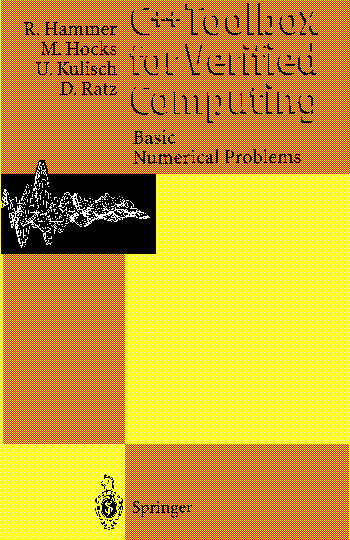
C++ Toolbox for Verified Computing
- Basic Numerical Problems -
Springer-Verlag,
Heidelberg (ISBN 3-540-59110-9),
New York (ISBN 0-387-59110-9),
1995.
Zusammenfassung
Dieses Buch stellt eine große Auswahl von Hilfsmitteln zur
Lösung wichtiger Aufgabenstellungen der numerischen Mathematik mit
Ergebnisverifikation vor. Die Autoren bedienen sich dabei der
C++-Bibliothek C-XSC, die
besonders für das wissenschaftliche Rechnen geeignet ist. Dieses
Buch ist die C++ Ausgabe der Numerical Toolbox
for Verified Computing, die auf der Computersprache PASCAL-XSC basiert.
Die Programmquellen dieses Buches sind über
http://www2.math.uni-wuppertal.de/org/WRST/xsc/download.html
frei erhältlich. Das Buch enthält
implementierte Algorithmen, viele Beispiele und Übungsaufgaben.
Ausführliche Auszüge aus dem Inhalt des PASCAL-XSC Bandes
können im Postscript-Format abgerufen werden. Einige der
behandelten Themen sind nicht in den Standardlehrbüchern der
Numerischen Mathematik enthalten. Die Lektüre dieses Buches ist
für Ingenieure, Mathematiker und Naturwissenschaftler, die sich
mit wissenschaftlichem Rechnen beschäftigen, sicherlich ein
großer Gewinn.
Programme zum Buch
Die C++ Programme zum Buch sind in Source-Code erhältlich über
http://www2.math.uni-wuppertal.de/org/WRST/xsc/download.html
Summary
This C++ Toolbox for Verified Computing presents an extensive set of
sophisticated tools to solve numerical problems with a verification of
the results using the features of the scientific computer language C-XSC. It
is the C++ edition of the Numerical Toolbox for
Verified Computing which is based on the computer language PASCAL-XSC. The
sources of this book are freely available via
http://www2.math.uni-wuppertal.de/org/WRST/xsc/download.html.
The overriding concern of this book is reliability
- the automatic verification of the result a computer returns for a
given problem. The book offers a general discussion on arithmetic and
computational reliability, analytical mathematics and verification
techniques, algorithms, and (most importantly) actual C++ implementations
in the form of working computer routines. In each chapter, examples,
exercises, and numerical results demonstrate the application of the
routines presented. It is not assumed that the reader has any prior
formal knowledge of numerical verification or any familiarity with
interval analysis. Some of the subjects that the book covers in detail
are not usually found in standard numerical analysis texts. This book
is intended primarily as a reference text, however, it can also be
used as a textbook for an advanced course in scientific computation
with automatic result verification.
